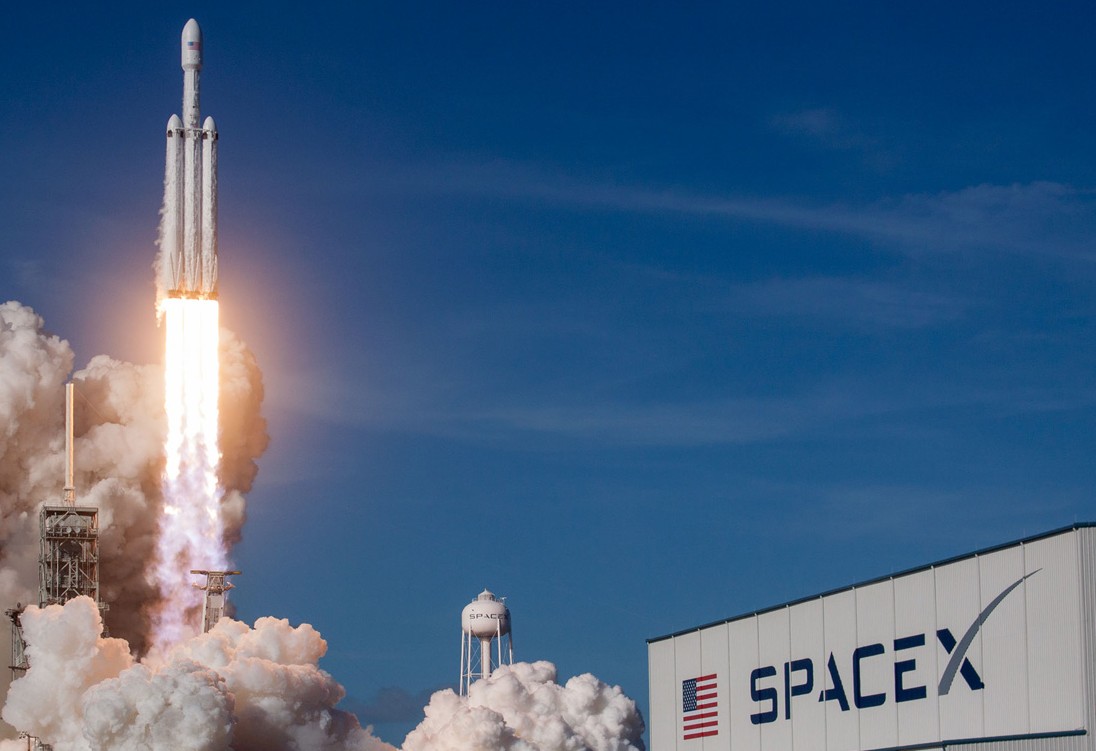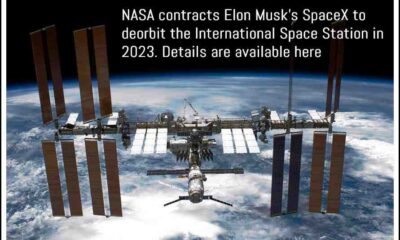News
SpaceX aims to launch 40 OneWeb satellites into orbit on Monday
Published
1 year agoon

On Monday, January 9, SpaceX is preparing to launch 40 Starlink satellites for the communications firm One Web. Following a successful debut in December, this will be the company’s second launch with OneWeb.
The launch is planned for Tuesday, January 10 at 8:15 p.m. PT (04:15 UTC), with a backup option available at 8:02 p.m. PT (04:02 UTC on January 10). At Florida’s Cape Canaveral Space Force Station’s Space Launch Complex 40, the Falcon 9 rocket carrying the satellites will take off. After stage separation, Falcon 9’s first stage will return to Earth and touch down on the Pacific Ocean’s, Of Course, I Still Love You droneship.
OneWeb’s Low Earth Orbit (LEO) satellite network will gain 40 more satellites with this launch, totaling more than 80% of its first-generation constellation. This will give its partners access to global wholesale connections, enabling the business to expand its service footprint to new markets like the US, southern Europe, Australia, and beyond.
1. Update
OneWeb’s broadband satellites were successfully launched into orbit by Falcon 9, and its first stage has landed in Landing Zone 1.
A tiny beach town in England ticks down to the launch of the first satellite for western Europe.
The flight will make Newquay, a small beach town in Cornwall in southwest England with 20,000 residents best known to surfers for its consistent waves flowing off the Atlantic, the preferred location for small satellites in western Europe. The mission, which will be the first time the business has done so outside of its American headquarters, will use Virgin Orbit’s
LauncherOne rocket to launch nine satellites, according to the corporation, which is partially owned by billionaire Richard Branson.
On Monday, last-minute preparations were being made for Virgin Orbit’s mission, which will turn the English surfing mecca of Newquay into the nation’s first spaceport, which will witness the first launch of orbital satellites into space from Western Europe.
On Monday night, a modified Boeing 747 with a rocket under its wing will take off from Newquay airport in front of a large audience. It will then soar over the Atlantic for nearly an hour before releasing a rocket at a height of about 35,000 feet. The flight will make Newquay, a small beach town in Cornwall in southwest England with 20,000 residents best known to
surfers for its consistent waves flowing off the Atlantic, the preferred location for small satellites in western Europe.
The mission, which will be the first time the business has done so outside of its American headquarters, will use Virgin Orbit’s LauncherOne rocket to launch nine satellites, according to the corporation, which is partially owned by billionaire Richard Branson. After the conflict in Ukraine prevented Europe from using the Russian Soyuz spacecraft, the new spaceport in
Newquay offers choices for launching smaller satellites at a crucial moment. Large satellite transporter Ariane 6 rocket from the European Space Agency (ESA) has also experienced delays.
Read Also – Said he wouldn’t put on a sweater…Rahul Gandhi
Smaller satellites, like those being launched from Newquay, which can enter low orbit at considerably shorter notice than bigger ones, are crucial for tactical military uses, as the Ukraine crisis has revealed. SUITABLE FOR CHANGE
However, it is contingent on the weather and the “health of the system,” and Virgin Orbit has warned there are backup dates available for later in January. The jet is anticipated to take off sometime between 2140 GMT and 2300 GMT. On Sunday, a Virgin Orbit representative said, “Assuming that everything continues to look okay, we’re currently tracking well for launch.”
Prior to the live transmission from a giant screen, space enthusiasts with tickets to the event will watch from a viewing area across the runway. Compared to the enormous satellites offered by businesses like Elon Musk’s SpaceX, Virgin Orbit focuses on smaller spacecraft, although the industry is expanding.
Britain anticipates that the new spaceport will help to advance its space industry. They are employed for reasons related to climate change, observation, urban development, and security. The nation boasts a sizable space industry with 47,000 workers that produce more satellites than any other nation outside of the United States, but those spacecraft first have to
be transported to spaceports in the United States, French Guiana, or Kazakhstan.
It has taken time for the mission to get going. Due to the numerous governmental permits required for the initial flight, it was postponed from late last year. (The crew at Devdiscourse did not edit this story; it was automatically created from a syndicated feed.)
- UKRAINE
- UNITED STATES
- BRITAIN
- GUIANA
- SOYUZ
Late Monday, SpaceX launched a second batch of OneWeb internet satellites
At 11:50 p.m. EST, the rocket lifted off from the Cape Canaveral Space Force Station, lighting up the night sky with a brilliant torrent of fiery exhaust. After eight minutes, twin sonic booms shook windows across Florida’s Space Coast as the reusable first stage descended to a nearby landing pad.
SpaceX had planned to launch another Falcon 9 rocket overnight, this time from California’s Vandenberg Space Force Base, to place 51 more Starlink internet relay stations in orbit, but bad weather forced a 24-hour delay.
In Florida, however, it was smooth sailing, and the Falcon 9’s second stage, carrying 40 OneWeb satellites, fired two engines to reach an initial 370-mile-high orbit tilted 87 degrees to the equator.
The satellites were then deployed in a half-hour sequence. To reach their operational altitude of approximately 745 miles, they will use on-board thrusters.
OneWeb satellites will relay data between customers and ground stations all over the world, providing global broadband connectivity for government agencies, businesses, internet service providers, and other users. OneWeb is partially owned by the British government, which uses its services for military communications.
OneWeb relied on Russian Soyuz rockets for its first 13 launches, but preparations for the 14th were halted shortly before launch last March in response to Western sanctions imposed in response to Russia’s invasion of Ukraine.
OneWeb was ordered by Russia to cut ties with the British military. When the company refused, Russia seized the 36 satellites ready for launch, causing OneWeb’s business plans to fall apart.
OneWeb satellites, which will operate in multiple orbital planes, will relay data between customers and ground stations all over the world, providing global broadband. Faced with a major setback in its timeline, OneWeb built replacement satellites and arranged a flight aboard an Indian GLSV Mark 3 rocket last October. SpaceX also agreed to launch OneWeb satellites, and the California rocket company launched 40 in December, bringing OneWeb’s constellation to 504.
While SpaceX is launching thousands of Starlink internet satellites — 3,666 have been launched so far — OneWeb intends to launch a fleet of “only” 648 relay stations at higher altitudes, allowing for global connectivity with fewer spacecraft.
“We have a very good relationship with SpaceX in general,” OneWeb’s chief technology officer, Massimiliano Ladovaz, told Spaceflight Now prior to the first Falcon 9 flight. “We’re not competing in the same markets; this is really about collaboration.”
To complete OneWeb’s constellation, three more launches are planned: two on Falcon 9s and one on another Indian GSLV Mark 3.
You may like
-


North Korea asserts that the test of a multiple-warhead missile was successful
-


The Student Wing of Congress storms the Exam Body NTA office and locks it from within
-


“During President Murmu’s address to Parliament, PM Modi was shown 73 times, and LoP Rahul Gandhi was shown six times”: Congress
-


NASA contracts Elon Musk’s SpaceX to deorbit the International Space Station in 2023.
-


A Caution For The CBI In The Delhi Court’s Arvind Kejriwal Custody Order
-


Bar Council of India requests that bar associations abstain from demonstrating in opposition to new criminal laws
